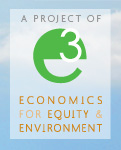E3 Network created RealClimateEconomics in 2009 to demonstrate the weight of peer-reviewed economic research that supports immediate and extensive emissions reduction as a precaution to avoid uncertain, but potentially catastrophic, climate change impacts. Part of what motivated us was the popular perception that climate change was “just” an environmental problem that we could not afford to solve. And while there are certainly economic analyses that strike such a cautionary tone, as economists publishing and teaching in this field, we knew that the weight of evidence to the contrary was compelling. Why, then, weren’t more people aware of it?
We understood that part of the blame fell on economists and academic publishing more broadly, for producing high quality research that is basically undecipherable to non-academic audiences. But we also suspected a bias in media reporting. A new journal article by political scientist, Jules Boykoff, in the latest issue of the journal PS: Political Science and Politics (the journal of record for the American Political Science Association) confirms such a bias.
Boykoff analyzed newspaper articles and television segments from the US media during the timeframe of the COP 16 meeting of the UNFCC in Cancún, Mexico in 2010, focusing on two important facets of the debates: the economic impacts and opportunities that climate change creates and the role that China plays in the negotiations. He examined the frequency in which the media covered these two topics, which sources they tended to cite, and which sources they tended to marginalize.
Here are some of the results of Boykoff’s analysis that are worth noting:
- The Guardian offered more extensive coverage of the Cancún Climate Change conference than all US media sources Boykoff analyzed combined. (see Figure 2, p. 254)
- In terms of who the media turned to as sources: NGOs dominated coverage (22% of all sources) while economists (1.6%) and climate justice activists (2.4%) were relatively ignored. Boykoff notes that a random person off the street has about as much a chance of turning up as a source in a story (2%) as a climate activist. (see Figure 3, p. 256)
- In all of the coverage of Cancún, only two economists were only turned to as sources: Robert Stavins of Harvard University and David W. Kreutzer of the Heritage Foundation. (see bottom of p. 254 and bottom of p. 255). Neither economist has published research strongly supportive of aggressive climate action.
- About 2 in 5 articles (39%) discussed the role that China played in climate change, with almost a quarter (24%) examining their green-energy development. Regarding the question of whether China was “flexible” or “obstinate” during the Cancún negotiations, it was a near even split, with 26% of the articles portraying China as contributing to a stalemate while 32% depicted its actions as adaptable and sometimes accommodating. (see p. 255)
The full citation for Boykoff’s article is below. Unfortunately, like so much of the compelling economic research on climate change in journals, it is not available for free online.
Jules Boykoff, “US Media Coverage of the Cancun Climate Change Conference” PS: Political Science and Politics Vo. 45, No. 1, 2012.

